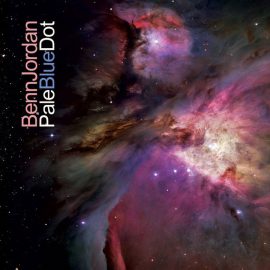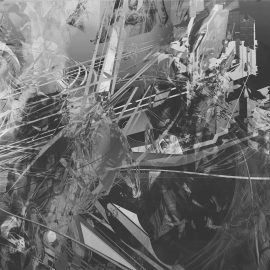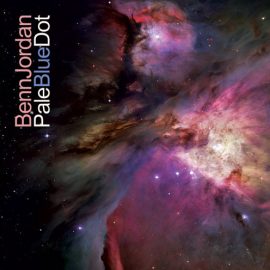On a cold Chicago winter night, I slam the door of a taxi cab and cross the street towards a nondescript Argentinian restaurant. My shoes slip on snow-covered ice, I’m anxious and a little bit nervous. Tonight I’m meeting Benn Jordan, also known as The Flashbulb, and I’m worried that some of my idyllic notions about this electronic musician may be shattered, his output forever tainted.
Benn shows up on time, and I instantly recognize him after rummaging through an extensive archive of online interviews, podcasts, and blog posts. He seems a little bit reserved, ready to supply any number of prepped retorts explaining recent controversial events surrounding him. After all, I’m a hungry media vulture, and Benn is a rebel who single-handedly took on a legal battle with Apple, meanwhile blatantly distributing his music through bit-torrent, endorsing piracy and peer-to-peer networks in his latest publicity stunt.
Well… not quite. The last entire statement could not be further from the truth. It is a convoluted twist of facts by the media frenzy. We hope to set the record straight, but primarily, our meeting is intended to discuss Benn’s latest album, Soundtrack To A Vacant Life, the state of the industry, and, of course, his approach to music.
“I guess you’re not a vegetarian,” I say, breaking the ice as we pick dishes from a menu that features only beef and chicken. Benn laughs, and we request a pitcher of sangria – a valuable social lubricant for any occasion. He asks if I’m recording this conversation, and I decline, explaining that I’m here just to chat, occasionally jotting down some notes. In a display of support for the musician’s hard work, I present my copy of STAVL, and after an obligatory autograph, an exchange of casual remarks about the restaurant, and the arrival of appetizers, we begin our conversation.
Benn is 29 and has lived on the South side of Chicago ever since he moved there at a young age. He tried to live on the West coast but found his beliefs were incompatible with the LA crowd. “My flight wasn’t cancelled because Mercury was in retrograde,” Benn writes on his blog, “I don’t make friends because of my ‘aura’. I do because I have good manners.” That pretty much sums up the attitude of a realist and a sceptic. Benn loves intelligent discussions on politics and ridicules the latest press coverage of an anti-Scientology movement by a group of disgruntled teenagers. “Do I seriously need to make a list of more important current issues than some tiny little sci-fi-based religion?” No disagreements there. “But for the record, I am not a Scientologist,” Benn states. I guess we should move on to a more substantial topic.
The events surrounding the iTunes controversy and a self-distributed album through the file-sharing network are not related, although one could argue otherwise and link the two through cause and effect. A Canadian-based label, Sublight Records, was launched in 2003 with its first full-length release by none other than The Flashbulb, titled Red Extensions Of Me. The label ceased its operations on June 21st, 2007, due to financial difficulties, just before the release of Benn’s eighth album, STAVL. Distributors then bought out the remaining stock at a huge discount, and somehow the catalogue appeared on iTunes. Neither the label nor the artists saw a dime from any purchases made through the interface. After a long, painful and, at times, non-responsive conversation through out-of-pocket lawyers with the giant, Apple agreed to remove the entire Sublight catalogue from its inventory. How the music got there or who received the royalties is still unknown.
With Sublight dead and STAVL in its second year of production with no outlet, Benn turned to his own label, Alphabasic. Owning 100% of all the mechanical, publishing, and performance rights, Benn was empowered to do as he pleased. But reconciling both business and music is not an easy task. When an artistic expression is pitted against profit margins, both are compromised. With continuous piracy, it’s obvious that the demands of listeners are not met. Something in the current model is missing.
“If you can’t beat ’em… join ’em,” Benn declares on his site. Jordan reasons that if an artist personally seeds [hosts a complete copy on a bit-torrent peer] an album before its inevitable proliferation on the network, they can at least ensure the quality of the rip, and its authenticity and include a personal message directing listeners to the label’s site, encouraging purchases or at least donations. A bold experiment, may I remind you, for someone perfecting every note, obsessively programming every beat and compulsively applying post-production techniques to 31 tracks for over two years!
Jordan’s goal, as it is clearly stated on his site, “…is about exploring and testing the music industry in an attempt to find a place where both the artists and the listeners are happy.” So there you have it, folks – the entire “controversy”, the creative “publicity stunt”. Sounds reasonable to me. So let’s discredit the headlines that proclaim “The Flashbulb Promotes Stealing Music”, “Artist Resorts to Begging For Tips”, or “The Flashbulb Releases New Album For Free”. Let’s proceed to the real reason behind my meeting with Benn – his music.
Benn began his musical career at a very young age. He has held a guitar in his hands for as long as he can remember. In his teens, he was a member of a metal band, playing lead guitar and singing. Upon moving to the city, Jordan submerged himself in Chicago’s acid house and industrial scenes. “It seems impossible to me that I’m on this planet for any other reason than writing music,” Benn states in the interview he gave to TorrentFreak, one of the sites that hosted the STAVL seed.
The Flashbulb’s first full-length release, M³ (Metatone Records, 2000), gained him an international following. Jordan followed up with remixes on Rephlex and continued to impress fans with his experimentation in IDM, abstract drum’n’bass, and then the emerging breakcore genre, with multiple releases on a handful of independent labels under half-a-dozen aliases. At the centre of Jordan’s vast stylistic spectrum, between the drilling beats and ambient soundscapes, lies the purest element of music – harmony. Jordan is one of the few modern electronic musicians with the theory behind his belt. And his musicianship is vivid all over his album.
With masterful control of various instruments, Jordan weaves through the tracks, clearly influenced by world music. We hear elements of flamenco guitar, African drums, sitar, and gentle piano layered over field recordings. With each piece no longer than three minutes, The Flashbulb introduces a new idea, evolves it, wraps it up, and moves on. “I think I may be ADD,” he laughs, “I can’t dwell too much on the same theme.” Taken out of context, its individual tracks may only sound like passing flashbacks, but played in sequence, the LP rides and flows in a chronological account of the major events in Benn’s life – an autobiography put to music.
“There is no breakcore on the album,” I state the obvious. “That’s right,” Benn confirms, “I wanted to write an expressive album that is geared less for the dance floor and more for a car ride or a pair of headphones.” “But what about the Amen break?” I ask, “Clearly, you’re violating the trends and moving away from the roots of Squarepusher. Aren’t you guys the same person anyway?” We both laugh at this absurdity. While, at one time or another, we are all influenced by current musical trends or are involved in pushing forward and pioneering genres, how can anyone truly sound like anybody else? In STAVL, Jordan truly proves, once and for all, that he is his own musician and that the similarities of playing the bass guitar over micro-programmed, broken drums are nothing more than that.
The perfectionist inside Jordan describes his collaboration with Greg Hirte and the awe with which he watched a professional violinist flawlessly execute the parts on the first take. Perhaps, during Jordan’s work with full orchestras and the recording of film scores, he will gain access to a wider range of instruments (Benn currently works with a Canadian film and TV licensing agency, Vapor Music Group).
Although the album definitely falls in the realm of electronic music, because of its sheer soaring breadth of instrumentation, composition and production techniques, I would much rather see it filed under modern classical. That doesn’t mean, however, that Jordan has completely turned towards strictly electro-acoustical composition. He does not deny the possibility of seeing more output from his acid-influenced Human Action Network moniker and even hints at a conceptual album to be released under his real name.
As far as other goals in life, Jordan shares with me his passion for photojournalism in politics. His dream is to be thrown into a significant time and place, to capture a historical moment, and to permanently imprint the memory on film. Until then, he shoots with his camera any chance he gets (he even brought it along to this meeting), occasionally posts his photos on his blogs, and spends the rest of his sleepless nights immersed in music.
Leaving the restaurant, I promise to follow up with my recommendations for recent releases, as well as pick up albums by Benn’s current inspiration, Academy Award-winning Argentinian film composer Gustavo Santaolalla (think 21 Grams and Amores Perros). “Argentinian, huh?” I think to myself, “It all makes sense now…” Or does it?
By the end of the night, my worries are dispelled. Behind the music I love is a very real, intelligent, and driven person. Benn seems equally relieved that I wasn’t there to grill or provoke him. He even offers to give me a ride home so I wouldn’t have to walk the dark, icy streets in search of a taxi cab. As for the result of Benn’s experiment – only time will tell. Till then, you can follow his updates and musings through his website listed below. I urge you to listen to and, if necessary, download Benn’s latest offering. You may just find yourself wanting to give back.
I leave you with this final thought from an aforementioned interview :
The thing RIAA is scared of is that their billion dollar backbone can no longer shelter people from exploring music themselves. Their business plan had evolved into telling the world what they will want to listen to and buy, and now they’ll have to actually compete with talented artists again. As the people regain control of the market, music will be judged by its content again and will be subjected to its own Darwinism. It is a very interesting time for the music industry… and since my entire life is devoted to making music, bring it on. I hope that this situation with my new record proves to other labels and artists that giving people exactly what they want is the smartest way to conduct any business.










